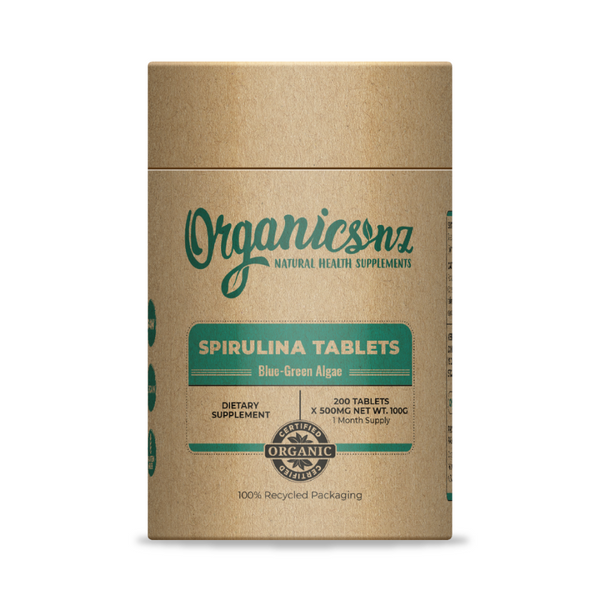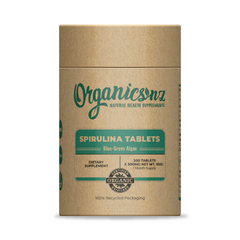Description
 Organic Spirulina ~ (Arthrospiro Plantentis) as seen under a microscope.
Organic Spirulina ~ (Arthrospiro Plantentis) as seen under a microscope.
Spirulina (Arthrospiro plantentis) from the Organics NZ range. Its a single-celled, blue-green algae, which is long thin and like a spiral coil. (only seen under a microscope) You’ve probably seen the the colour, smell and taste, commonly served in smoothies, a lot like seaweed.
Spirulina has been around since the 15th century, when it was discovered by the Aztecs in Lake Texcoco. One of natures Superfoods and commonly grown in alkali water, it converts sunlight into energy. Commercially it is grown in large tanks, but we source our Organic Spirulina from Myanmar, where it grows naturally. Its also been found growing in lake Chad (central Africa) and along the Great Rift Valley in East Africa.
The United Nations World Health Organisation (WHO) had this to say about Spirulina. “Spirulina represents an interesting food for multiple reasons, rich in iron and protein, and is able to be administered to children without any risk. WHO considers it a very suitable food”.
What are its benefits?
-
Supports Stomach health
-
Aids in Reducing blood sugar levels for type 2 diabetes
-
Assists in lowering blood pressure
-
Boosts immunity
-
Effective for hair and nail growth
-
Over 100 vitamins and minerals
Top 5 Super functions:
-
Highly nutrient dense – with over 100 different vitamins and nutrients, Organic Spirulina is an all-round Super Food for your body and skin health.
-
Rich in Antioxidants – containing an extraordinary antioxidant/polypeptide called Phycocyanin. Phycocyanin is an important blue pigment which boosts the immune system, protects the liver and supports detoxification.
-
Helps to reduce blood pressure and cholesterol – by increasing nitric oxide production in the body. Nitric oxide is a gas molecule that helps widen blood vessels, which improves blood flow and therefore reduces blood pressure. Studies have also shown that spirulina can lower triglycerides and LDL (bad) cholesterol, and raise HDL (the “good”) cholesterol.
-
Improved digestion – Spirulina is an alkalising food, containing around 2,000 enzymes that aid in digestion. It has a suppressant effect on bad bacteria like E. coli and candida while stimulating beneficial gut flora. (complex community of microorganisms that live in the digestive tracts of humans and other animals)
-
Protein powerhouse – spirulina has the highest concentration of protein of any known food. It’s 60 – 70 percent protein by weight. It is a complete protein (meaning that it contains all 8 essential amino acids necessary for human health) and it has 18 amino acids overall. Making it a good replacement for fatty and cholesterol-rich meat and dairy products in one’s diet.
Suggested Use
Tablets ~ we recommend 3 g per day and up to 10g per day for active lifestyles.
Tablets offer an easier and more convenient option to meet your daily needs. Take 6 tablets per day with water in the morning.
Nutrition/Ingredients
Beta carotene (Vitamin A) is good for healthy eyes and vision. Beta carotene in Spirulina is ten times more concentrated than carrots.
Iron is necessary for oxygen delivery to the cells, brain development and normal growth, through Spirulina, Iron is easier to absorb than iron supplements. 3g per day is equivalent to 85% of your bodies daily needs, based on a 2000 calorie diet.
Carbohydrates usually starches and sugars, provide a readily available energy source.
Fiber is important for providing regularity of bowel movements.
Zinc an antioxidant important for enzyme function and maintaining cell integrity.
Copper for iron and fat metabolism, connective tissue synthesis, maintenance of the heart muscle, functioning of the nervous and immune systems, maintains red blood cell membranes
Fats are a source of stored energy, supply physical protection and insulation for tissues and form important portions of cell membrane structure.
Chlorophyll eliminates body odour and cleans out the digestive tract.
*These statements have not been evaluated by the Food and Drug Administration. This product is not intended to diagnose, treat, cure or prevent any disease.
Precaution
Some individuals may suffer from allergic reactions to this algae, including rashes, hives, vomiting, diarrhoea and difficulty breathing.
People with the rare metabolic condition phenylketonuria (PKU) are not able to metabolise the amino acid phenylalanine, and therefore should avoid taking Spirulina. Likewise, people with autoimmune diseases such as rheumatoid arthritis, multiple sclerosis, or lupus should not take Spirulina, as it could stimulate the immune system and worsen the condition. Spirulina may also, counteract the effectiveness of certain medicines, such as prednisone, which are commonly used for treating asthma and other inflammatory diseases.
Some commercial Spirulina supplements may have been grown in contaminated water, meaning they have high levels of Lead, Mercury and Arsenic, which does not meet with the World Health Organisation. We therefore recommend, buying Spirulina from reputable sources, who are in control of the whole process from growing to packaging to ensure a safe and trusted product.
-


